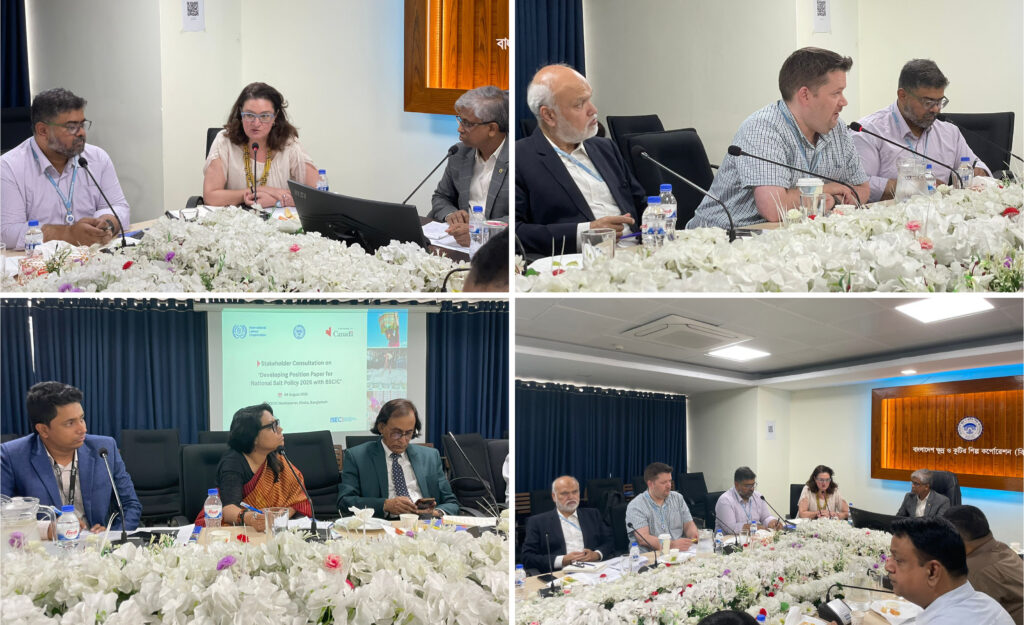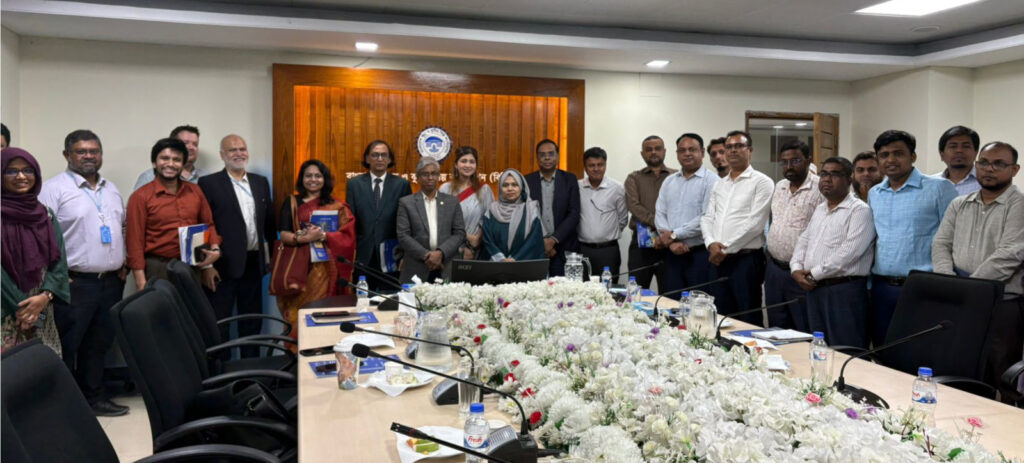
A national-level stakeholder consultation was held on August 4, 2025, in Dhaka to inform the development of a position paper for the upcoming National Salt Policy 2026. The consultation was jointly organized by Innovision Consulting and the Bangladesh Small and Cottage Industries Corporation (BSCIC), with the support of the International Labour Organization’s (ILO) “Improving Skills and Economic Opportunities for Women and Youth in Cox’s Bazar (ISEC)” project. The meeting brought together senior representatives from BSCIC, including its Honourable Chairman and Board Members, members of the Salt Cell, researchers from Innovision Consulting, and representatives from the ILO-ISEC project.
Facilitated by Kawser E Jannat, Manager at BSCIC, the session began with opening remarks from Md. Saiful Islam, Chairman of BSCIC, who highlighted the critical role of the salt sector in rural livelihoods and national self-sufficiency. Md. Sarwar Hossain, Chief of the Salt Cell, followed with a brief presentation outlining BSCIC’s engagement in the salt industry and the historical context of salt sector policy in Bangladesh. On behalf of Innovision Consulting, Tasmiah Tabassum Rahman, Portfolio Director, introduced the consultation’s relevance, emphasizing the need for a participatory and evidence-based approach in shaping the upcoming policy.

Md. Mohibbullah Al Maruf, Senior Associate at Innovision, presented the key findings from a recent salt sector assessment conducted in Cox’s Bazar under the ILO-ISEC project. He highlighted structural inefficiencies, weak demand estimation, outdated production methods, post-harvest losses, and regulatory gaps. He also emphasized the potential for diversified industrial use of salt. His presentation concluded with policy recommendations aligned with national priorities and global best practices to guide sectoral reform. Following this, Kazi Shahed Ferdous, Country Director of Innovision Consulting, outlined the proposed structure and focus areas of the position paper. These included improving productivity, strengthening market linkages, ensuring decent working conditions, diversifying salt products, and embedding climate-smart solutions.

During the open discussion session, Ruchika Bahl, Chief Technical Advisor and Head of the ILO Project Office in Cox’s Bazar, stressed the importance of integrating gender and climate perspectives into the policy framework. Drawing on India’s Gujarat experience, she exemplified how solar-powered salt production has enhanced women’s participation and reduced environmental impact. Syed Saad Hussain Gilani, Chief Technical Advisor at ILO, highlighted the need to enhance social protection for salt workers and envisioned Bangladesh as a future exporter of diversified salt products, with support from foreign investment.
Ron Johnson, Technical Specialist in Labour Inspection and OSH at ILO, emphasized the occupational health risks faced by salt workers and called for improved WASH infrastructure and environmental safeguards as part of sectoral expansion.
Naveed Akbar, National Programme Manager for Economic, Livelihoods, and Enterprise Development at ILO, linked the position paper’s relevance to Bangladesh’s commitments under the Sustainable Development Goals, particularly SDG 3 (Good Health and Well-being), SDG 8 (Decent Work and Economic Growth), SDG 9 (Industry, Innovation and Infrastructure), and SDG 13 (Climate Action).

Md. Zafar Iqbal Bhuiyan, Deputy General Manager of the Salt Industry Development Office in Cox’s Bazar, advocated for sustainable health solutions for salt workers through permanent medical camps and targeted technology transfers. He also stressed the importance of addressing existing data gaps, enabling experience-sharing through international exposure visits, and ensuring private sector and development actor engagement in policy implementation.
Participants collectively agreed to develop the position paper through a collaborative and consultative approach, ensuring alignment with both field-level evidence and institutional priorities. The meeting concluded with a commitment to define roles, set timelines, and jointly contribute to a forward-looking and inclusive National Salt Policy 2026.